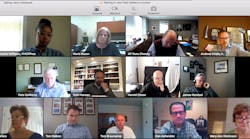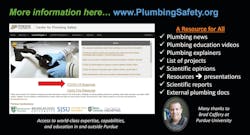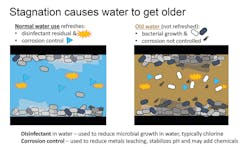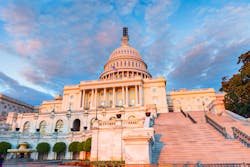PILC gathers representatives from across the plumbing industry to discuss those challenges and opportunities the industry faces, and how best to coordinate their efforts by pooling relevant information and resources and offering mutual support. PILC currently includes 17 associations, professional societies, non-profits and third-party laboratories representing manufacturers, engineers, contractors, and water experts from around the world.
In attendance for the May 14th video conference were representatives from ARCSA (the American Rainwater Catchment Systems Association), ASA (the American Supply Association), ASPE (the American Society of Plumbing Engineers), ASSE (the American Society of Sanitary Engineers), AWE (the Alliance for Water Efficiency), CDA (the Copper Development Association), CISPI (the Cast Iron Soil Pipe Institute), IAPMO (the International Association of Plumbing and Mechanical Officials), ICC (the International Codes Council), MCAA (the Mechanical Contractors Association of America), NSF International (not an acronym), PMI (Plumbing Manufacturers International), PPFA (the Plastic Pipe and Fittings Association), UA (the United Association), WQA (the Water Quality Association), as well as various guests and members of the trade press.
The meeting began with welcomes and opening remarks from Billy Smith of the ASPE and Kerry Stackpole of PMI. Both mentioned the history-making events of recent weeks, with Stackpole remarking that the PILC was “made for this moment.”
Russ Chaney of IAPMO then shared some of his thoughts and his association’s perspective. The pandemic, he said, had been a blow to public confidence in the safety of public spaces and it would be a while before that confidence returned. At the same time, the virus had now focused the public on such important issues as water infrastructure and water safety, making now an ideal time to conduct outreach.
After a brief review of notes from the PILC’s 2019 came an update of action items from that meeting. One item in particular was a letter to the EPA seeking the agency’s leadership in best nomenclature for different types of plumbing systems and different types of water, based on levels of possible bio-contamination (for example, “graywater,” “blackwater,” etc.).
Rehabilitating Water Systems
The first guest speaker was Dr. Andrew J. Whelton, PhD., who spoke on a topic of high importance as America reopens following the pandemic: rehabilitating building water systems. Dr. Whelton was an ideal choice of speaker, as problems affecting the built environment have been a focus of his work at Purdue University where he is Professor of Civil Engineering and Environmental and Ecological Engineering.
Dr. Whelton outlined problems related to the restart, noting that many buildings have undergone extended periods of low- to no-water use, often without ever having been designed (let alone tested) for such an extended shut-down period. The main concern is stagnation—a build-up of either chemicals or microorganisms due to low water movement.
Compounding the problem is the fact that most public officials lack the expertise to make informed decisions on how, when, and in what stages plumbing systems should be restarted.
To help supply some of that know-how, Dr. Whelton and his team at Purdue were recipients of the U.S. National Science Foundation RAPID Award. They are giving ongoing guidance to the plumbing and public health sectors on building water safety. The team is conducting both field testing and lab testing to determine how to fully recover contaminated buildings water system devices and equipment.
But perhaps the most important work to be done is raising public awareness of water safety issues. To that end the Center for Plumbing Safety at Purdue University has developed a web site, www.plumbingsafety.org with access to their expertise and information.
Representatives from IAPMO, ICC and ASPE later shared their thoughts on the discussion. Many ASPE members are currently being contacted by facilities managers for information on the best way to restart plumbing systems they designed.
NIST and Research Priorities
After a short break, Andrew Persily, Chief of the Energy and Environment Division at the National Institute of Standards and Technology (NIST) discussed one of the Institute’s most recent and most important reports: Measurement Science Research Needs for Premise Plumbing Systems.
Shocking as it is to realize, the vast majority of plumbing system design and analysis is still being done using data and methods dating back to the 1940s (for example, Hunter’s Curve to determine flow rates). Given the huge advances in plumbing technology, every passing year sees those methods and that data become more and more inaccurate.
The report is based on NIST, EPA and WRF 2018 workshops and the 2018 Federal Register call for information. The report cites 59 specific research recommendations which break down mainly into two categories: foundational measurement science and applied research. While not all recommendations will actually become research programs, the report is an important step forward in engaging stakeholders and setting priorities.
The next steps forward include communicating research needs (which will probably be done via a series of virtual workshops/webinars) and developing an implementation plan. The entire report is available, free of charge, at https://doi.org/10.6028/NIST.TN.2088.
Legislation and Regulation
In a joint presentation, Sara Yerkes (Sr. Vice President, Government Relations, ICC), Stephanie Salmon (Federal Government Affairs Consultant, PMI) and Dain Hansen (Executive Vice President, Government Affairs, IAPMO) discussed various state and federal legislative and regulatory priorities.
One of the most important recent joint successes of the collective organizations was having the entire plumbing and heating supply chain—not just those performing emergency plumbing work—deemed “essential” during the pandemic. Likewise was similar legislative language to include workers who support operations in commercial buildings.
As part of its pandemic response, ICC worked with individual states—contacting almost all governors personally—to recommend practices for virtual inspections. One challenge to establishing and promoting best practices has been the lack of a coordinated response; some states are following federal guidelines, some are creating their own, creating a patchwork of different regulations across the country.
While the federal response to coronavirus has seen almost $2.2 trillion devoted to individual and business aid, up until now none of that money has made its way to 501( c ) 6 nonprofits (which includes industry trade associations). The PILC members are strongly in support of legislation introduced by Representatives Chris Pappas (D-NH), Brian Fitzpatrick (R-PA), Gil Cisneros (D-CA) and Greg Steube (R-FL) that would allow trade associations access to the next round of PPP.
Hansen, Salmon and Yerkes stressed that direct aid is only part of the coronavirus relief package; tax changes (including payroll and retirement plans) amount to roughly $591 billion so far (retirement plan minimum distribution rules have been waived for 2020, just as an example). Unemployment assistance has been expanded to up to 39 weeks.
And there is even more money in the pipeline. The HEROES Act (currently stalled in the Senate) contains an additional $3 trillion dollars. If approved it would provide $1 trillion to state and local governments, would expand unemployment insurance to the end of January 2021, and would provide another round of $1,200 payments per person, including $1,200 per child.
The crisis has hit in what was already a busy legislative year. Government funding will need to be addressed on September 30th to avoid a shutdown. Many federal health programs are set to expire on November 30th. Many pandemic response programs are set to expire at the end of the year.
There are two major water-related bills in the Senate, the AWIA and DWIA. The America’s Water Infrastructure Act of 2020 would authorize 20 water resources projects totaling about $17 billion, as well as 14 modified feasibility studies. The Drinking Water Infrastructure Act is a smaller companion bill that would provide approximately $2.5 billion in federal authorizations for drinking water infrastructure. The funds would be spread across several small programs, including a new competitive grant program for underserved communities under the Assistance for Small and Disadvantaged Communities Program.
Other important legislation includes changes to the Lead in Copper rule (the first overhaul of the rule since 1991). It will require a public inventory of lead service lines (but will not change the ppm rule). Water utilities have been critical of the EPA for over-complicating the rule.
WaterSense
The EPA has undertaken to review WaterSense standards, it is widely assumed (although no official will go on record) in response to statements made by President Trump regarding the performance of toilets, facuets and showerheads.
In response, PILC added two action items regarding WaterSense for 2020. First, Mary Ann Dickinson, President and CEO for the AWE, asked the PILC as a body as well as individual members to sign a letter of comment in response to the review stating their strong support for the program. The letter states in part, “Customer satisfaction criteria do NOT belong in WaterSense product specifications themselves, but there are reasonable uses for customer satisfaction information within WaterSense.”
Second, Pete DeMarco will draft and circulate a PILC letter of support for the WaterSense program for submission to Federal Register prior to the comment period closing date of June 9th. Individual PILC organizations were also encouraged to submit their own letters of support.
WaterSense is still working its way towards becoming a nation-wide standard.
Conclusions and Commitments
Other issues discussed at the meeting included possible changes to the Fair Housing Act; the Trump Administration has argued (without supporting evidence) that modern plumbing codes are a barrier to affordable housing.
As states re-open, a host of legislative concerns have emerged surrounding worker compensation and employer liability. These include exposure liability, product liability, securities liability and medical malpractice.
It has been an amazingly busy legislative year so far with 1,200 bills in congress, close to 150 of which have been made into law. Over 30 states have passed some 900 coronavirus regulations.
The meeting was then opened up to comments. ARCSA President David Crawford advised the coalition on the update of ASPE/ARCSA Standard 63. He noted “a huge upsurge in public awareness… people are looking to take charge of their own water resources.”
Pete DeMarco mentioned the ongoing issue of water access, pointing to current shortages in the Navajo Nation. Not having enough water for handwashing during a pandemic, DeMarco said, can be a death sentence. The PILC, he said, should lend its voice to the issue.
In closing, the tri-chairs thanked the attendees and expressed their hopes to meet in-person in San Antonio, TX, next year. ASPE Executive Director and CEO Billy Smith remarked, “Who knows what will happen next? Who could have thought in January that we would be where we are today?” He added, “We tend to take personal relationships for granted. Bring about some positive focus in the middle of this situation. Reach out to your people.”






